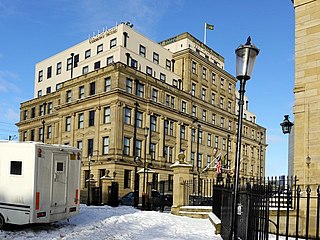Top Qs
Timeline
Chat
Perspective
Northumberland County Council
Local authority in North East England From Wikipedia, the free encyclopedia
Remove ads
Northumberland County Council is the local authority for the non-metropolitan county of Northumberland in North East England. Since 2009 it has been a unitary authority, having also taken over district-level functions when the county's districts were abolished.
Remove ads
The council has been under no overall control since 2021, being led by a Conservative minority administration. It is based at County Hall, Morpeth. Since 2024 the council has been a member of the North East Mayoral Combined Authority.
Remove ads
History
Summarize
Perspective
Elected county councils were established in 1889 under the Local Government Act 1888, taking over administrative functions previously carried out by unelected magistrates at the quarter sessions. The city of Newcastle upon Tyne had been a county corporate since 1400 with its own quarter sessions, and Newcastle's independence from the county was maintained by making it a county borough. The county council was elected by and provided services to the remainder of the county, which area was termed the administrative county. Berwick-upon-Tweed was also a county corporate, but was not considered large enough to provide its own county-level services. It was therefore included in the administrative county of Northumberland.[4] Tynemouth subsequently also became a county borough in 1904, removing it from the administrative county.[5]

The first elections were held in January 1889. The council formally came into being on 1 April 1889, on which day it held its first official meeting at the Moot Hall, Newcastle upon Tyne, the courthouse (built 1811) which had served as the meeting place of the quarter sessions which preceded the county council.[6] The first chairman of the council was Matthew White Ridley, who was also the Conservative MP for Blackpool (in Lancashire).[7]
The county was reformed in 1974, becoming a non-metropolitan county and ceding further territory around the Newcastle conurbation to the new metropolitan county of Tyne and Wear. Until 1974 the lower tier of local government comprised numerous boroughs, urban districts and rural districts. In 1974 the lower tier was reorganised and Northumberland was left with six districts: Alnwick, Berwick-upon-Tweed, Blyth Valley, Castle Morpeth, Tynedale and Wansbeck.[8]
Until 1981 the county council had its meeting place at the Moot Hall, which formed an exclave of the administrative county in central Newcastle.[9] The main administrative offices were at the adjoining County Hall. The exclave became part of the city in 1974 and therefore outside the county council's territory.[10] The council moved to Morpeth in 1981.
As part of the 2009 structural changes to local government in England, Northumberland's six districts were abolished and their functions were taken over by the county council.[11][12] As part of the 2009 changes the council was given the option of changing its name to "Northumberland Council".[13] After consultation with the public the council decided to keep the name "Northumberland County Council".[14]

In 2024 a combined authority was established covering Northumberland, County Durham, Gateshead, Newcastle upon Tyne, North Tyneside, South Tyneside and Sunderland, called the North East Mayoral Combined Authority. It is chaired by the directly elected Mayor of the North East and oversees the delivery of certain strategic functions across the area.[15]
Remove ads
Governance
Summarize
Perspective
Since 2009, Northumberland County Council has provided both county-level and district-level services. The whole county is also covered by civil parishes, which form an additional tier of local government.[16]
Political control
The council has been under no overall control since 2021, being led by a minority Conservative administration. Following the 2021 election the Conservatives won a majority of the seats, but lost their majority later that year following a Liberal Democrat gain in a December 2021 by-election.[17][18]
Political control of the council since the 1974 reforms has been as follows:[19][20][21]
Two-tier non-metropolitan county
Unitary authority
Leadership
The leaders of the council since 1998 have been:[22]
Composition
Following the 2025 election, the composition of the council is:
The next election is due in 2029.
Remove ads
Elections
Since the last full review of boundaries in 2013 the council has comprised 67 councillors representing 66 electoral divisions, each of which elects one councillor except Alnwick which elects two. Elections are held every four years.[31] New division boundaries have been drawn up to come into effect for the 2025 elections, increasing the number of councillors to 69.[32]
Premises

The council is based at County Hall on the southern outskirts of Morpeth, which was purpose-built for the council and opened in 1981.[33] Proposals to move the council's headquarters to Ashington were considered between 2014 and 2017, with building work starting on the new site in Ashington. In 2017 work on the new site was aborted after the proposed sale of the Morpeth site fell through. The council subsequently decided to stay in Morpeth and renovate County Hall instead.[34]
Prior to 1981 the council was based in Newcastle. Meetings were held at the Moot Hall. A large office building called County Hall was built opposite the Moot Hall in 1910 to serve as the council's main offices.[35]
Remove ads
References
External links
Wikiwand - on
Seamless Wikipedia browsing. On steroids.
Remove ads




